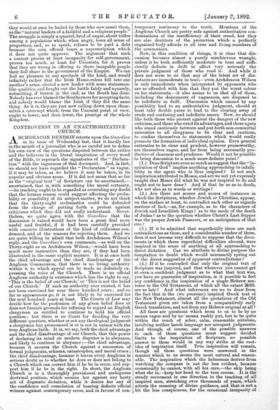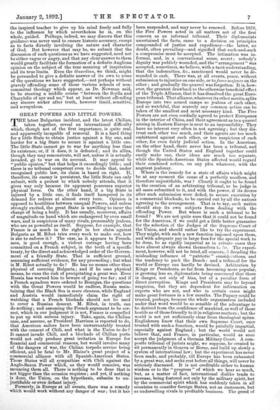CONTROVERSY IN AN UNAUTHORITATIVE CHURCH.
ARCHDEACON DENISON retorts upon the Guardian in its issue of Wednesday last, that it hardly lies in the mouth of a journalist who is so careful not to define his own view of the questions disputed between the critics and the believers in the literal inspiration of every word of the Bible, to reproach the signatories of the " Declara- tion " with the vagueness of that document. And, in fact, we should not have regarded the " Declaration " as vague, if it may be taken, as we believe it may be taken, in its popular and obvious sense. If it did not mean that so far as the "original text" of Scripture can be ascertained,— ascertained, that is, with something like moral certainty, —its teaching ought to be regarded as overruling any doubt that the human reason could suggest affecting the proba- bility or possibility of its subject-matter, we do not think that the thirty-eight ecclesiastics could be defended from the charge of putting forth a protest against criticisms which they did not really understand. Never- theless, we quite agree with the Guardian that the discussion it raised would have been a great deal more useful and fruitful, if it had been carefully provided with concrete illustrations of the kind of criticisms con- demned, and of the reasons for rejecting them. And we are quite willing to admit that both Archdeacon Wilson's reply, and the Guardian's own comments,—as well on the Thirty-eight as on Archdeacon Wilson,—would have been much more instructive than they are, if they had been illustrated in the same explicit manner. It is at once both the chief advantage and the chief disadvantage of the Anglican Communion, that there is no living authority within it to which appeal can be made as definitely ex- pressing the voice 'of the Church. There is no official Anglican authority in existence which has the right to say, This is the belief of our Church,' or This is not the belief of our Church.' If such an authority ever existed, it has not been exercised-for near three hundred years ; and so far as appearances go, it is not likely to be exercised for the next hundred years at least. The Courts of Law may decide how far the profession of any given belief. does or does not furnish grounds for refusing to regard an English clergyman as entitled to continue to hold his official position ; but there is no Court for deciding the very different question, whether or not any theological judgment a clergyman has pronounced is or is not in unison with the true Anglican faith. It is, we say, both the chief advantage and the chief disadvantage of our Church, that this power of declaring its mind on modern disputes is in abeyance, and likely to continue in abeyance ;—the chief advantage, because it secures the Church against a succession of formal judgments, schisms, catastrophes, and moral crises ; the chief disadvantage, because it leaves every Anglican in serious doubt as to whether he does or does not belong to a Church which can correct him if he be in error, and sup- port him if he be in the right. In short, the Anglican Church is in a thoroughly provisional and ambiguous doctrinal position, which secures her against any hasty act of dogmatic dictation, while it denies her any of the confidence and consolation of bearing definite official witness against contemporary error, and in favour of con- temporary testimony to the truth. Members of the Anglican Church are pretty safe against authoritative con- demnations of the insufficiency of their creed, but they are also destitute of the protection which a perfectly organised body affords to all true and living members of the communion.
Now, in this condition of things, it is clear that dis- cussion becomes almost a purely mischievous wrangle, unless it be both sufficiently moderate in tone and suffi- ciently definite in drift to affect very seriously the private judgment of those who read it. And while it does not seem to us that any of the latest set of dis- putants are immoderate in tone,—even Archdeacon Wilson is only immoderate when interpreted by opponents who are so offended with him that they put the worst colour on his statements,—it also seems to us that all of them, including the denouncers of vagueness, are disposed to be indefinite in drift. Discussion which cannot by any possibility lead to an authoritative judgment, should at least take double pains to lead to the clearing away of crude and confusing and indefinite issues. Now, we should like both those who protest against the dangers of the new criticism, and those who extol its advantages, and those again who stand cautiously between and put forth non-committal entreaties to all clergymen to be clear and cautious, to confine themselves to statements which would really promote the formation of individual opinion. Even general entreaties to be clear and prudent, however praiseworthy, are themselves vague, and far from being necessarily pro- ductive of clearness and prudence. Would it not be possible to bring discussion to a much more definite point ? (1.) Does Scripture even so much as suggest that the " in- spiration of God" implies anything approaching to infalli- bility in the agent who is -thus inspired? Is not such inspiration attributed to Moses, and are we not yet expressly taught that Moses did what he was not inspired to do and ought not to have done ? And if that be so as to deeds, why not also as to words or writings ?
(2.) Are there not scores and scores of instances in which the Scriptures, whether Jewish or Christian, appear, on the surface at least, to contradict each other as regards matters of fact,—as, for example, as to the characters of Jewish and Israelitish Kings ? as to the mode of the death of Judas ? as to the question whether Christ's Last Supper was the proper Jewish Passover, or an anticipation of that rite ?
(3.) If it be admitted that superficially there are such contradictions as these, and a considerable number of them, does it not become very difficult to suppose that the docu- ments in which these superficial difficulties abound, were inspired in the sense of anything at all approaching to direct dictation. Can we attribute to divine purpose the temptation to doubt which would neeessarily spring out of the direct suggestion of apparent contradictions ?
(4.) If it be contended that only the original text of Scripture was inspired, and that wherever you cannot get at even a confident judgment as to what that text. was, you have no guarantee of inspiration, is it possible to feel any confidence in the inspiration of a single Hebrew sen- tence in the Old Testament, of -which all the extant MSS. are so late ? And what inferences are we to draw from the fact that in the (we presume) inspired Greek text of the New Testament, almost all the quotations of the Old Testament given are taken from a comparatively early Greek translation, and not from any Hebrew original at all ?
All these are questions which seem to us to be by no means vague and by no • means rashly put, but to be quite within the reach of sober, calm, reasonable criticism, involving neither harsh language nor arrogant judgments. And though, of course, one of the possible answers .to each of these questions must suggest decided limits to the inspiration of Scripture, no possible answer to them would in any way strike at the root- idea of inspiration itself. True inspiration will remain, though all these questions were answered in the manner which to us seems the most natural and reason- able. The inspiration which the helmsman derives from watching the compass is not the less evident, because occasionally he cannot, with all his care,—the ship being what she is,—keep her head to the true course. It is the steady movement in one direction in the teaching of all inspired men, stretching over thousands of years, which attests the meaning of divine guidance, and that is not a bit the less conspicuous, for the occasional incapacity of the inspired teacher to give up his mind freely and fully to the influence by which nevertheless he is, on the whole, guided. Perhaps, indeed, we may discern that this guidance was never used to ensure historic accuracy, except as to facts directly involving the nature and character of God. But however that may be, we submit that the discussion of such questions as we have suggested, need not be either vague or angry, and that any clear answer to them would greatly facilitate the formation of a definite Anglican opinion on the subject of the true meaning of inspiration and its true limits. Even the Guardian, we think, might be persuaded to give a definite answer of its own to some of the questions we have suggested,—not perhaps without gravely offending some of those various schools of non- committal theology which appear, as Dr. Newman said, to be steering a middle course " between the Scylla and Charybdis of aye and no," but at least without offending any sincere seeker after truth, however timid, sensitive, and scrupulous.















































 Previous page
Previous page